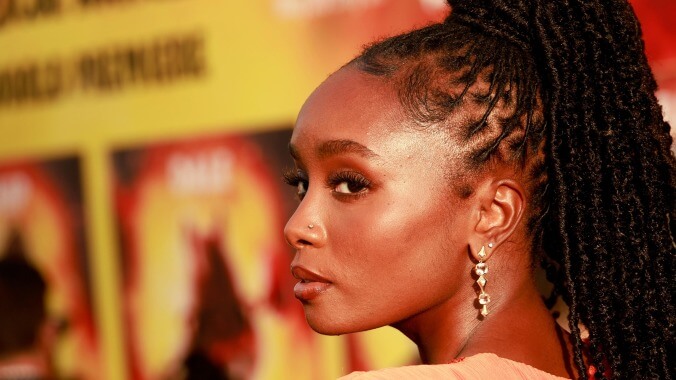Kiki Layne gets in on Don’t Worry Darling shade, says most of her scenes were cut
Don't Worry Darling star Kiki Layne and on-screen husband Ari’el Stachel poke fun at the Olivia Wilde film

We regret to inform you that the Don’t Worry Darling press cycle isn’t quite over (though surely it must be soon, right? Right?). Yes, the film is finally out, and Chris Pine and Florence Pugh skipped the final premiere, and Pugh may or may not have gotten in a screaming match with Olivia Wilde on set, but we’re past that now. Onto a new player: Kiki Layne.
Layne plays the role of Margaret in DWD, a mysterious former friend of Alice’s (Pugh) whose breakdown makes Alice suspicious of the idyllic town of Victory. But apparently, what happens on screen isn’t Margaret’s full story. “The best thing about #DontWorryDarling is that I was lucky enough to meet [Ari’el Stachel],” Layne wrote on Instagram of her co-star and real-life partner. “They cut us from most of the movie, but we thriving in real life.” (The post includes a behind-the-scenes video of the couple from a scene that does not appear in the movie.) She added the hashtags: #GotMyMan, #GotMyCheck, and #EverythingHappensForAReason.
Tony winner Satchel similarly poked fun at the limited appearance of their husband-and-wife scenes, sharing a cheeky TikTok with the caption “When you end up on the cutting room floor … Go see Don’t Worry Darling.” In a more sentimental post, he wrote of Layne, “My favorite part of my experience in Don’t Worry Darling. This woman did phenomenal work and I was thirsty the second I met her.”
Though buried under the film’s many other controversies, Layne’s role had already prompted criticism before her post. As the film’s only prominent Black character, Margaret’s intense suffering and ultimate sidelining was highlighted as one of the film’s major issues by some audience members. As The Ringer’s Adam Nayman writes, “Wilde’s deployment of a stoic, suffering African American woman as combination truth-teller and sacrificial lamb is the worst kind of cliché, with Layne’s character slaughtered on the altar of a white heroine’s triumphant self-actualization.”
In that context, Margaret’s story being cut from “most” of the movie is even more troubling—and it explains why Layne, like Pugh, was absent from much of the Don’t Worry Darling promotional tour. While the film may be raking in dollars, its legacy is only becoming more tainted as time goes on.